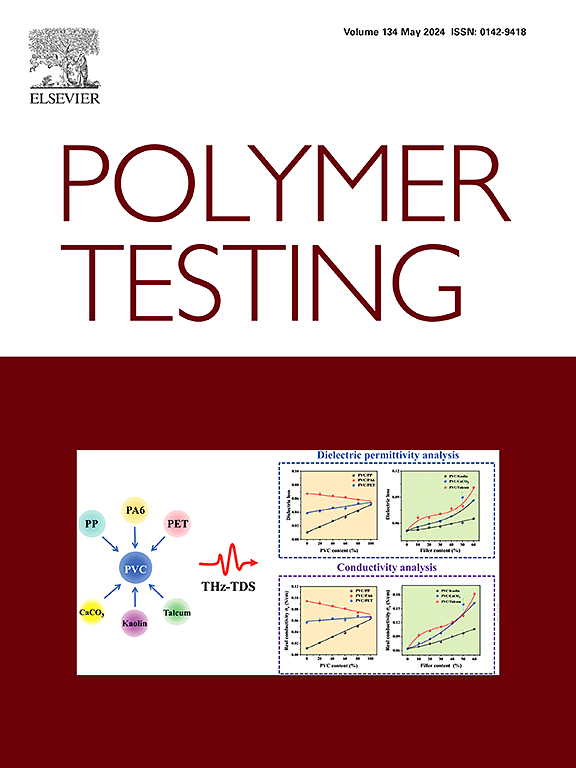Mechanical behavior of HTCE propellant: Dependence on strain rate and temperature
IF 5
2区 材料科学
Q1 MATERIALS SCIENCE, CHARACTERIZATION & TESTING
引用次数: 0
Abstract
High-solid-content polymer composites such as solid propellants are widely used in different fields. Although the proportion of polymer components in the material is relatively low, the mechanical influence of polymers on composite materials is crucial. The mechanical response of the materials is highly rate and temperature dependent. This study aims to investigate the effects of strain rate and temperature on the uniaxial tensile properties of HTCE propellant. To this end, an HTCE propellant with a specific composition was prepared, and its tensile behaviour and cyclic softening characteristics were examined under strain rates ranging from 0.00104 s−1 to 0.10417 s−1. The results demonstrate that HTCE propellant exhibits a highly nonlinear stress-strain relationship and high dewetting performance. With increasing strain rate, the ultimate tensile stress, strain, failure strain and stress all show varying degrees of enhancement. Also, they exhibit a positively correlated exponential function relationship with engineering strain. Furthermore, uniaxial tensile tests conducted at temperatures ranging from 233.15 K to 343.15 K reveal that the mechanical properties of HTCE propellant are significantly improved at lower temperatures. At last, a computational constitutive model about CSED(cumulative strain energy density) and is presented in a manner consistent with experiment data.
HTCE推进剂的力学性能:对应变速率和温度的依赖
固体推进剂等高固含量聚合物复合材料广泛应用于不同领域。虽然高分子组分在材料中的比例相对较低,但高分子对复合材料的力学影响至关重要。材料的机械响应高度依赖于速率和温度。研究了应变速率和温度对HTCE推进剂单轴拉伸性能的影响。为此,制备了一种具有特定成分的HTCE推进剂,并在0.00104 s−1 ~ 0.10417 s−1的应变速率范围内测试了其拉伸性能和循环软化特性。结果表明,HTCE推进剂具有高度非线性的应力-应变关系和良好的脱湿性能。随着应变速率的增加,极限拉应力、应变、破坏应变和应力均有不同程度的增强。与工程应变呈正相关的指数函数关系。在233.15 ~ 343.15 K的单轴拉伸温度下,HTCE推进剂的力学性能得到了显著改善。最后,建立了与实验数据相符的CSED(累积应变能密度)与ε的计算本构模型。
本文章由计算机程序翻译,如有差异,请以英文原文为准。
求助全文
约1分钟内获得全文
求助全文
来源期刊

Polymer Testing
工程技术-材料科学:表征与测试
CiteScore
10.70
自引率
5.90%
发文量
328
审稿时长
44 days
期刊介绍:
Polymer Testing focuses on the testing, analysis and characterization of polymer materials, including both synthetic and natural or biobased polymers. Novel testing methods and the testing of novel polymeric materials in bulk, solution and dispersion is covered. In addition, we welcome the submission of the testing of polymeric materials for a wide range of applications and industrial products as well as nanoscale characterization.
The scope includes but is not limited to the following main topics:
Novel testing methods and Chemical analysis
• mechanical, thermal, electrical, chemical, imaging, spectroscopy, scattering and rheology
Physical properties and behaviour of novel polymer systems
• nanoscale properties, morphology, transport properties
Degradation and recycling of polymeric materials when combined with novel testing or characterization methods
• degradation, biodegradation, ageing and fire retardancy
Modelling and Simulation work will be only considered when it is linked to new or previously published experimental results.
 求助内容:
求助内容: 应助结果提醒方式:
应助结果提醒方式:


